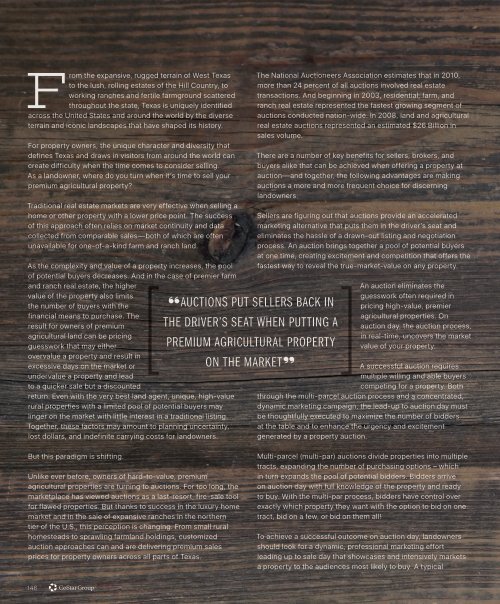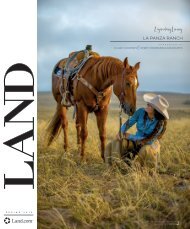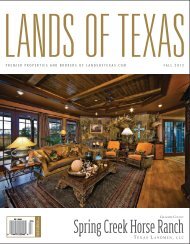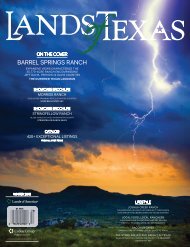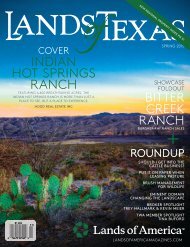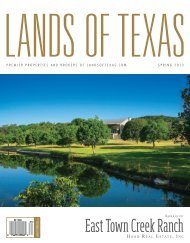Create successful ePaper yourself
Turn your PDF publications into a flip-book with our unique Google optimized e-Paper software.
From the expansive, rugged terrain of West <strong>Texas</strong><br />
to the lush, rolling estates of the Hill Country, to<br />
working ranches and fertile farmground scattered<br />
throughout the state, <strong>Texas</strong> is uniquely identified<br />
across the United States and around the world by the diverse<br />
terrain and iconic landscapes that have shaped its history.<br />
For property owners, the unique character and diversity that<br />
defines <strong>Texas</strong> and draws in visitors from around the world can<br />
create difficulty when the time comes to consider selling.<br />
As a landowner, where do you turn when it’s time to sell your<br />
premium agricultural property?<br />
Traditional real estate markets are very effective when selling a<br />
home or other property with a lower price point. The success<br />
of this approach often relies on market continuity and data<br />
collected from comparable sales—both of which are often<br />
unavailable for one-of-a-kind farm and ranch land.<br />
As the complexity and value of a property increases, the pool<br />
of potential buyers decreases. And in the case of premier farm<br />
and ranch real estate, the higher<br />
value of the property also limits<br />
the number of buyers with the<br />
financial means to purchase. The<br />
result for owners of premium<br />
agricultural land can be pricing<br />
guesswork that may either<br />
overvalue a property and result in<br />
excessive days on the market or<br />
undervalue a property and lead<br />
to a quicker sale but a discounted<br />
return. Even with the very best land agent, unique, high-value<br />
rural properties with a limited pool of potential buyers may<br />
linger on the market with little interest in a traditional listing.<br />
Together, these factors may amount to planning uncertainty,<br />
lost dollars, and indefinite carrying costs for landowners.<br />
❝AUCTIONS PUT SELLERS BACK IN<br />
THE DRIVER’S SEAT WHEN PUTTING A<br />
PREMIUM AGRICULTURAL PROPERTY<br />
ON THE MARKET❞<br />
The National Auctioneers Association estimates that in 2010,<br />
more than 24 percent of all auctions involved real estate<br />
transactions. And beginning in 2003, residential, farm, and<br />
ranch real estate represented the fastest growing segment of<br />
auctions conducted nation-wide. In 2008, land and agricultural<br />
real estate auctions represented an estimated $26 Billion in<br />
sales volume.<br />
There are a number of key benefits for sellers, brokers, and<br />
buyers alike that can be achieved when offering a property at<br />
auction—and together, the following advantages are making<br />
auctions a more and more frequent choice for discerning<br />
landowners.<br />
Sellers are figuring out that auctions provide an accelerated<br />
marketing alternative that puts them in the driver’s seat and<br />
eliminates the hassle of a drawn-out listing and negotiation<br />
process. An auction brings together a pool of potential buyers<br />
at one time, creating excitement and competition that offers the<br />
fastest way to reveal the true-market-value on any property.<br />
An auction eliminates the<br />
guesswork often required in<br />
pricing high-value, premier<br />
agricultural properties. On<br />
auction day, the auction process,<br />
in real-time, uncovers the market<br />
value of your property.<br />
A successful auction requires<br />
multiple willing and able buyers<br />
competing for a property. Both<br />
through the multi-parcel auction process and a concentrated,<br />
dynamic marketing campaign, the lead-up to auction day must<br />
be thoughtfully executed to maximize the number of bidders<br />
at the table and to enhance the urgency and excitement<br />
generated by a property auction.<br />
But this paradigm is shifting.<br />
Unlike ever before, owners of hard-to-value, premium<br />
agricultural properties are turning to auctions. For too long, the<br />
marketplace has viewed auctions as a last-resort, fire-sale tool<br />
for flawed properties. But thanks to success in the luxury home<br />
market and in the sale of expansive ranches in the northern<br />
tier of the U.S., this perception is changing. From small rural<br />
homesteads to sprawling farmland holdings, customized<br />
auction approaches can and are delivering premium sales<br />
prices for property owners across all parts of <strong>Texas</strong>.<br />
Multi-parcel (multi-par) auctions divide properties into multiple<br />
tracts, expanding the number of purchasing options – which<br />
in turn expands the pool of potential bidders. Bidders arrive<br />
on auction day with full knowledge of the property and ready<br />
to buy. With the multi-par process, bidders have control over<br />
exactly which property they want with the option to bid on one<br />
tract, bid on a few, or bid on them all!<br />
To achieve a successful outcome on auction day, landowners<br />
should look for a dynamic, professional marketing effort<br />
leading up to sale day that showcases and intensively markets<br />
a property to the audiences most likely to buy. A typical<br />
148


